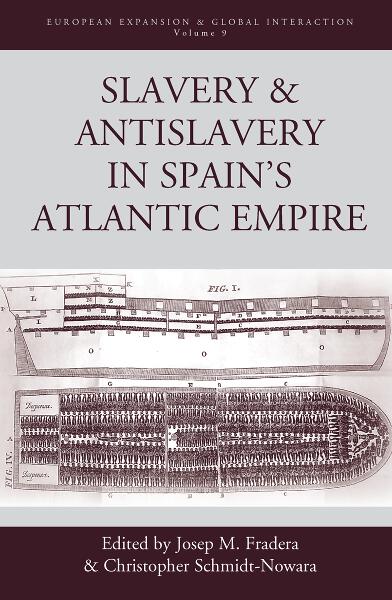Slavery and Antislavery in Spain’s Atlantic Empire, published June 2013, offers a wide-ranging view of the Spanish slave trade, from Caribbean trafficking to Spanish antislavery protests. Editors Josep M. Fradera and Christopher Schmidt-Nowara speak to the trials and rewards of editing the collection of work, their influences, and a prediction of what will be the future important studies in the field.
____________________________________________
 Berghahn Books: What drew each of you to the study of the Spanish empire’s Atlantic holdings?
Berghahn Books: What drew each of you to the study of the Spanish empire’s Atlantic holdings?
Josep M. Fradera and Christopher Schmidt-Nowara: Colonial slavery is crucial to understanding Spanish metropolitan history not only during the era of overseas expansion but also during the age of revolutions and the transition from the massive early modern empire to the smaller nineteenth-century colonial system, in which slavery and other forms of forced labor were central. Historians still have not integrated the Atlantic, imperial, and global aspects of Spanish history; one of the aims of this collection is to bring those perspectives to the fore.
BB: What aspect of compiling an edited collection did you find most challenging? Most rewarding?
CSN: In this case, revising the translations and working with scholars who spoke several different languages made the editing more time consuming. At the same time, this cosmopolitan conversation was thrilling and enlightening.
BB: Do you think there are aspects of this work that will be controversial to other scholars working in the field?
CSN: We make a strong argument about the specific features of slavery in the Spanish overseas empire, and how it differed from other Atlantic empires, which should provoke discussion. We should be clear, however, that we are not reviving the theses of Frank Tannenbaum’s classic work, Slave and Citizen (1946) because research and debates have moved the questions far beyond those that he posed several decades ago. There is no need to reinvent the wheel. For example, these articles clearly demonstrate the connections and influences that crossed imperial and national boundaries, an approach at odds with Tannenbaum’s more rigid comparative perspective.
BB: Is there one iconic figure who has featured in one way or another in your field of research, living or dead, for whom you have particular admiration and why?
CSN: There are several, some of whom are included in this collection. However, I would single out Stanley Stein’s Vassouras (1957) as the still the greatest work on slavery in the Iberian world. Dale Tomich and Robin Blackburn’s treatments of slavery and abolition in Atlantic and global frameworks from the late eighteenth century through the nineteenth are also fundamental.
JMF: The work of the great Cuban historian Manuel Moreno Fraginals, The Sugarmill (1978), is seminal. However, the revisions to it over the last four decades have been profound. Rebecca Scott’s Slave Emancipation in Cuba (1985) demonstrated the importance of the slaves’ agency in shaping the institution, one that was much more flexible than was once believed, an argument also advanced by Stanley Engerman in his studies of New World slavery. Seymour Drescher’s comparative works on abolitionism have shown that even within an Atlantic-history framework, national/imperial specificities are still crucial.
BB: If there is one particular area of interest or question which you feel is especially pertinent to your field today and in the future, and which may not necessarily been the focus of much attention, could you share your thoughts with us?
JMF and CSN: The relative absence of the Catholic Church—religious personnel, theologians, Catholic intellectuals and politicians, parishioners—from the struggles over slavery and abolition in the modern era is an issue still in need of explanation, especially since figures like the Dominican friar Bartolomé de las Casas were so pivotal in the debates over enslavement and freedom in the early days of conquest and colonization. In the eighteenth and nineteenth centuries, the secular character of antislavery in the Iberian world is a marked contrast to the central role of religion in the Anglo-American world.
_______________________________________________
Josep M. Fradera is Professor of History at the Universitat Pompeu Fabra and a researcher at the Institució Catalana de Recerca i Estudis Avançats (ICREA). He is the author of Colonias para después de un imperio (2005).
Christopher Schmidt-Nowara is Professor of History and Prince of Asturias Chair in Spanish Culture & Civilization at Tufts University. He is the author of Slavery, Freedom, and Abolition in Latin America and the Atlantic World (2011).
